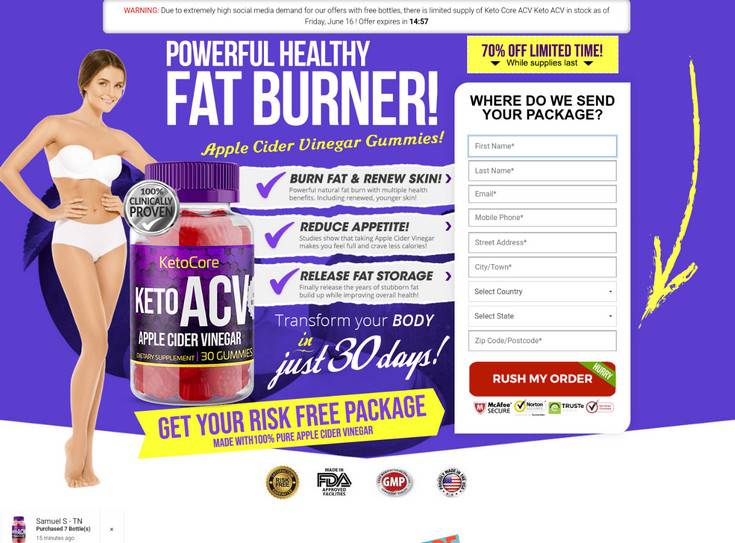Scam websites are aggressively promoting ProHealth Keto+ACV Gummies using fake endorsements and misleading weight loss claims. They utilize deepfake videos and fake celebrity testimonials to make it appear as if ProHealth Keto+ACV Gummies were featured on Shark Tank and endorsed by celebrities and medical experts. But it’s all an elaborate scam designed to sell overpriced, ineffective keto gummies. 
Scam Overview
Keto diets remain hugely popular due to their potential to induce fat-burning through ketosis. Scammers are capitalizing on interest in keto supplements by promoting ProHealth Keto+ACV Gummies as a shortcut to substantial weight loss. The scams feature deepfake videos of Shark Tank investors, doctored footage impersonating Drew Barrymore and other celebrities, and false claims that ProHealth Keto+ACV Gummies were validated by medical experts. Pictures of impressive before and after results are actually stock photos or stolen from real people. In reality, ProHealth Keto+ACV Gummies have never been featured on Shark Tank. All purported celebrity endorsements are fabricated. Claims of easy, rapid weight loss are grossly exaggerated. The scammers are using deception to promote overpriced keto gummies containing minimal effective ingredients. Their aim is to exploit consumer trust in celebrities and TV personalities to make ProHealth Keto+ACV Gummies seem like a miracle cure discovered on Shark Tank and validated by scientists and doctors. But none of these endorsements are real. Avoid these scams promoting ProHealth Keto+ACV Gummies with false claims.
How the Scam Works
The ProHealth Keto+ACV Gummies scams begin with a video impersonating Shark Tank. It shows “investors” engaging in a bidding war over ProHealth Keto+ACV Gummies, with captions like “Biggest Deal in Shark Tank History!” Deepfake technology mimics the investors perfectly. A fake Fox News report then states ProHealth Keto+ACV Gummies were the “biggest deal EVER” on Shark Tank. More deepfakes feature Dr. Oz, Ellen DeGeneres, and Drew Barrymore raving about their weight loss from the keto gummies. There are also fake interviews with scientists explaining how the gummies burn fat. Other tactics include:
- False claims ProHealth Keto+ACV Gummies were featured on Good Morning America with hosts and Dr. Jen Ashton endorsing them.
- Fake logos from networks like CNN, BBC, and USA Today acting as news endorsements.
- AI-generated videos of customers providing glowing testimonials and impressive before/after photos.
- Lies about clinical studies proving ProHealth Keto+ACV Gummies cause substantial weight loss and have zero side effects.
- Misleading claims the gummies are “clinically proven” to burn fat without dieting or exercise.
- Countdown timers and warnings about limited supplies to create false scarcity.
- Inflated prices and auto-billing without consent through third-party retail platforms.
- Refusal to provide refunds and difficult cancellation processes for recurring orders.
The goal is to overwhelm consumers with fake endorsements that make ProHealth Keto+ACV Gummies seem like a scientifically-proven miracle pill supported by doctors and celebrities. This convinces buyers the overpriced gummies are worth the inflated cost. In reality, the gummies contain minimal keto and ACV ingredients unlikely to produce dramatic results. The videos are AI-generated fakes, and claims about easy weight loss are lies. But the scammers bank on people falling for the false social proof.
Recognizing Red Flags
Warning signs a ProHealth Keto+ACV Gummies promotion is a total scam:
- Celebrity endorsements seem off and cannot be verified elsewhere. Assume they are AI-generated fakes.
- The website seems hastily thrown together, with typos, grammatical errors, and other amateur mistakes.
- Aggressive sales tactics create false scarcity and insist you act now before “discounts” expire.
- Refusal to disclose ingredients or dosages upfront proves they have something to hide.
- No genuine customer reviews, only suspicious written testimonials.
- “As seen on Shark Tank” claims that cannot be verified. Do your research.
- Auto-billing and inflated pricing through third-party retailers, not the manufacturer.
When in doubt, search online to confirm whether ProHealth Keto+ACV Gummies were really endorsed by celebrities making the claims in the promotions. And remember, no legitimate medical expert would validate keto gummies as a miracle cure or rapid weight loss solution. Maintain healthy skepticism.
What to Do If You Are Scammed
If you placed an order and provided your credit card information, act quickly:
Call your credit card company ASAP. Request to cancel the transaction. Explain you were scammed into an unauthorized purchase using your card.
Dispute the charges. If the charges go through, dispute them with your card issuer as fraudulent. Provide details about the misleading claims.
Request a chargeback. If disputes fail, ask your credit card provider to reverse the charge. Emphasize the gummies are not the product as heavily advertised.
Cancel any recurring orders or subscriptions. Contact the merchant immediately to cancel auto-billing and future shipments related to your account.
Mark emails as spam. This will block future scam offers from the fraudsters using your purchase history and email.
File an FTC complaint. Submit a complaint to the Federal Trade Commission detailing the fake endorsements, false scarcity marketing, and other deceptive practices.
Leave online reviews. Post detailed reviews about the scam on retailer sites warning others from falling victim. Spread awareness about these shady practices.
Contact your state AG. Consider reporting the scam to your state attorney general’s office for potential consumer protection violations. The more complaints submitted, the more power regulators have to take action.
ProHealth Keto+ACV Gummies Scam FAQs
Are ProHealth Keto+ACV Gummies really featured on Shark Tank?
No. Scammers create fake Shark Tank videos using deepfake technology. No keto gummies have ever been featured on the show. All investor bids and endorsements are fabricated.
Did celebrities like Drew Barrymore endorse the gummies?
No. The celebrity endorsements are AI-generated fakes. Do independent research to confirm endorsement claims, which scammers make up. Assume all remarkable weight loss results are false.
Are ProHealth Keto+ACV Gummies FDA approved?
No supplements require FDA approval. Scammers falsely suggest approval to seem legitimate. Responsible brands submit to third-party quality testing like cGMP certification, which these gummies likely lack.
Will the gummies help me lose weight rapidly?
No. Claims of substantial weight loss without diet or exercise changes are bogus. At best, the gummies may assist slightly with appetite regulation. But they are no magic pill. Sustainable weight loss requires lifestyle changes.
Can I get a refund if unhappy?
You will likely have difficulty getting a refund. Scammers make refunds hard or impossible to obtain by design to avoid complaints. But you can dispute the charges as fraudulent if the gummies fail to perform as deceitfully advertised. Don’t fall for refund refusal excuses.
What risks are there if I try the gummies anyway?
You risk side effects from unknown ingredients, high shipping costs, and recurring monthly charges you didn’t consent to. There are also risks of identity theft and credit card fraud from entering information on shady sites. Only purchase vetted brands from reputable retailers, never directly from scammy websites.
The Bottom Line
ProHealth Keto+ACV Gummies scams aim to trick consumers desperate for weight loss into buying overpriced supplements that likely contain minimal effective ingredients. They utilize sophisticated tricks like deepfakes and fake celebrity endorsements that exploit human psychology. But their miraculous claims are lies. Maintain skepticism when evaluating such aggressive promotions to protect yourself. Seek out objective reviews before purchasing any keto gummies. And know that no magic pill exists – real weight loss requires proper nutrition, physical activity, and determination over an extended period. Make informed choices to achieve your health and wellness goals safely.




